In my summer of 2013, we completed a five-week course on Human-Centered Design for Social Innovation offered by +Acumen and IDEO.
The end product was a student based app/webpage that fostered social innovation for students. Students can bounce off ideas, get feedback on their ideas from others, find people with different skills and talents, and essentially build the ultimate team.
"Human-Centered Design for Social Innovation is a five-week course that will introduce you to the concepts of human-centered design and help you use the design process to create innovative, effective, and sustainable solutions for social change. "

The course covered the learning and practice of the human-centered design process. We utilized the process to answer the following question:
How might we enable more young people to become social entrepreneurs?
"While more and more youth are interested in social entrepreneurship as a means for tackling some of the world’s toughest challenges, many aspiring social entrepreneurs fail to move beyond the initial idea phase because the infrastructure to support them is lacking. Some young social entrepreneurs are unable to overcome the status quo or family and friends’ expectations. Others are unable to gain access to networks or mentors that could provide the knowledge and experience to confront major decisions, or help them build resilience in the face of setbacks. As part of this design challenge, you’ll work with your team to design new systems or strengthen existing programs that cultivate and support social entrepreneurship as a viable career path."
Preliminary Research
We began by compiling what we already know, things we are assuming, and what we want to know.
ALREADY KNOW:
campus organizations for social entrepreneurship exist
[duplicate] there are social entrepreneurship clubs & decals already offered on-campus
on-campus competitions
kickstarter
bplan
hackathons
designathons
some on-campus groups:
Blueprint
Haas startups
CITRIS (The Foundry)
Dosomething.org
Piazza - only Q/As -- need websites that have people asking for contractual work
top-tier schools have higher entrepreneurship levels
most people are discouraged and don’t think they can
most people don’t know where to start
most people don’t want to talk about their ideas/don’t think they’re good
there are networking venues already available but sometimes they’re hard to navigate and people end up using work-arounds (i.e. posting on facebook to look for programmers or designers, etc.)
ASSUMPTIONS:
many students have great ideas but no outlet
people think HAAS & Business school = only way to start/be in a business
most people don’t know that different types of people/skill sets are valuable to business/entrepreneurship
students might need a way to connect with students and mentors who have different or similar skills in order to form teams/collaborate
students might need an infrastructure or forum that’s not intimidating and that provides structure and direction
probably forums & groups online
classes?/decals?
study abroad [as a way to get into entrepreneurship?]
NEED TO LEARN/WOULD LIKE TO KNOW:
why do top-tier schools have more social entrepreneurship?
would students be open to something that helps them network?
build it on bspace? bConnected? bMail? Piazza?
current reception of bspace + bConnected + Piazza
are there already groups available?
where do you find mentors/funding/advice?
any software out there that has capabilities for social entrepreneurship?
how do people currently try to engage in social entrepreneurship ventures?
what are some flaws in the system?
what works? why?
what can people do without funding?
what are the necessary steps to pursuing a social entrepreneurship goal?
best ways to connect people?
how much do people care about the social aspect?
do people WANT to change things?
what change is most important to people?
what kind of skills are most important to being an entrepreneur?
Research Plan
Then developed a research plan
Research Questions for Students
1. Why do you think top-tier schools have more social entrepreneurship than non-top-tier schools?
2. Tell me about the challenges you faced when you tried to pursue a startup idea and/or tried to connect with people to work with you on a project?
3. How do people currently try to engage in social entrepreneurship ventures?
what are some flaws in the system?
what works? why?
what can people do without funding?
4. Would students be open to something that helps them network with other students? How about with mentors/professionals?
5. What is your reception of your school’s current web-based communication and collaboration environment? ex. bSpace, Piazza, bMail
6. Are there any on-campus groups/areas that serve as a communication and collaboration environment?
6. Are there any on-campus groups/areas that serve as a communication and collaboration environment?
7. Where do you find mentors/funding/advice?
8. Do you think there are enough outlets and support for students to take up social entrepreneurship opportunities?
Research Questions for Professionals/Social Entrepreneurs
1. What are the necessary steps to pursuing a social entrepreneurship goal?
what works? why?
what can people do without funding?
best ways to connect people?
2. What can people do without funding?
3. What kind of skills are most important to being an entrepreneur?
4. What kind of lessons did you learn in your journey to become a social entrepreneur?
What would you have done differently?
What kind of support would you have liked?
User Research
Conducted user research across different targets including a startup accelerator, a humanitarian student organization and volunteer community offering free health and social services to underserved populations, students, and entrepeneurs.
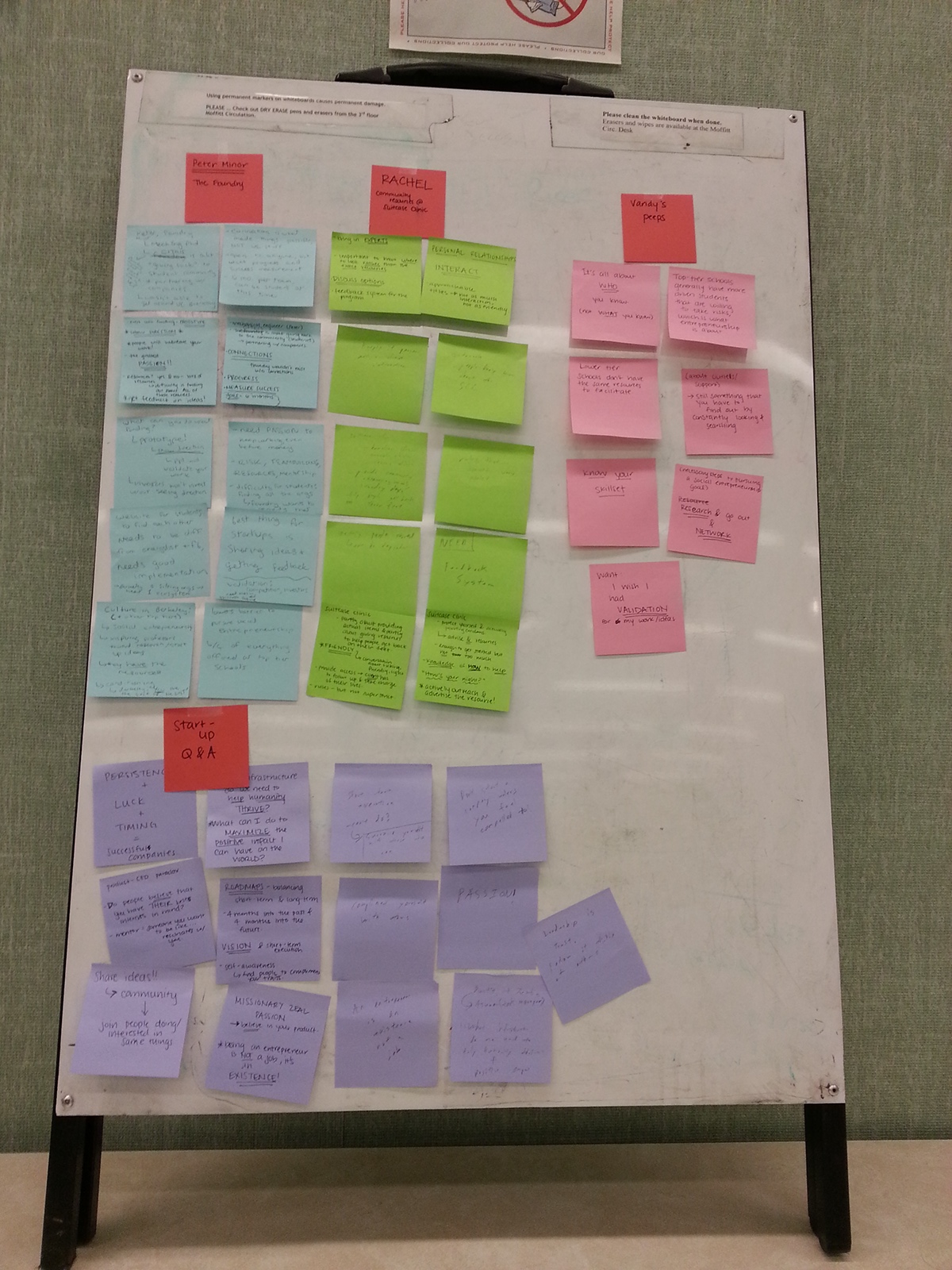



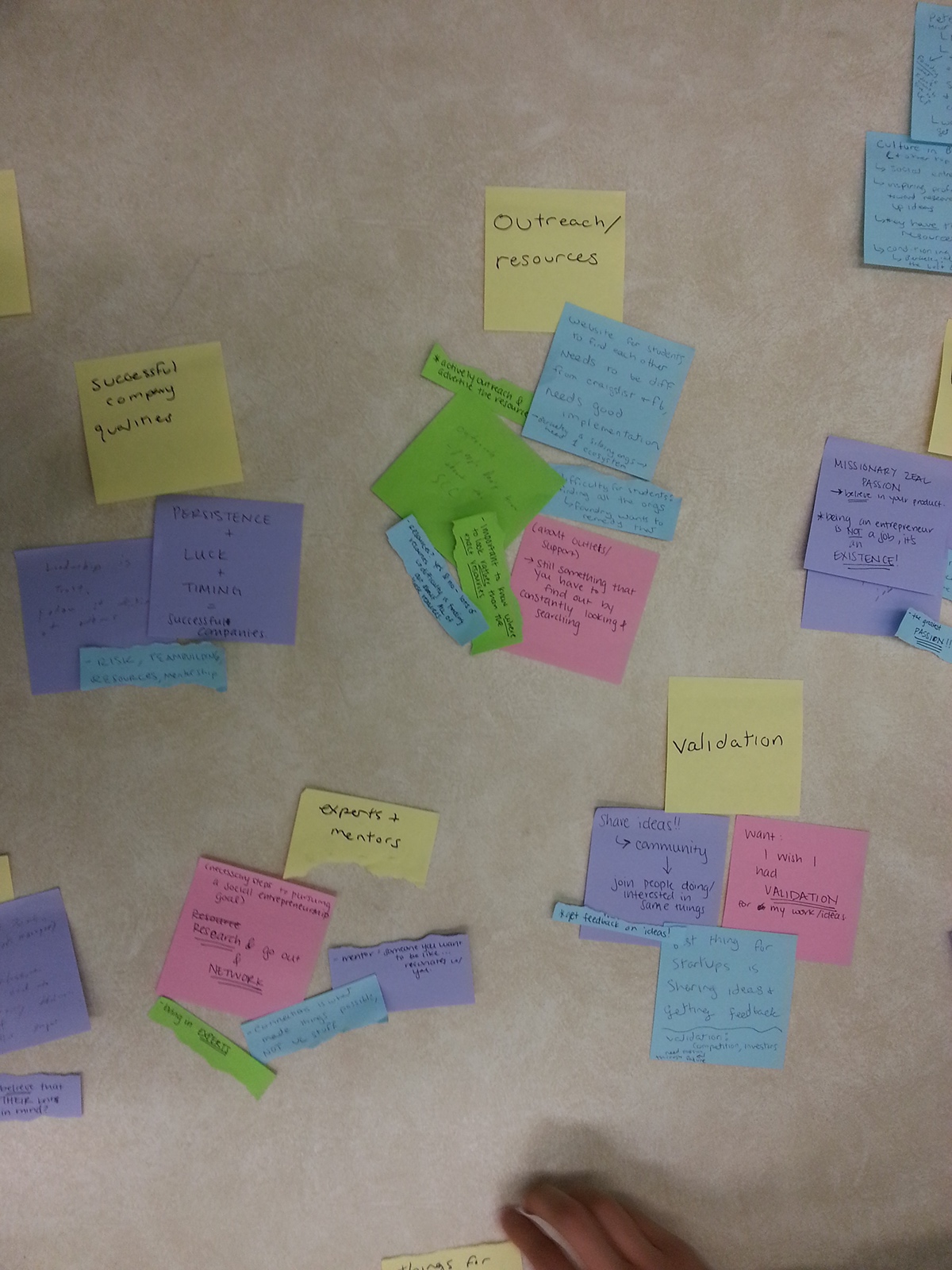

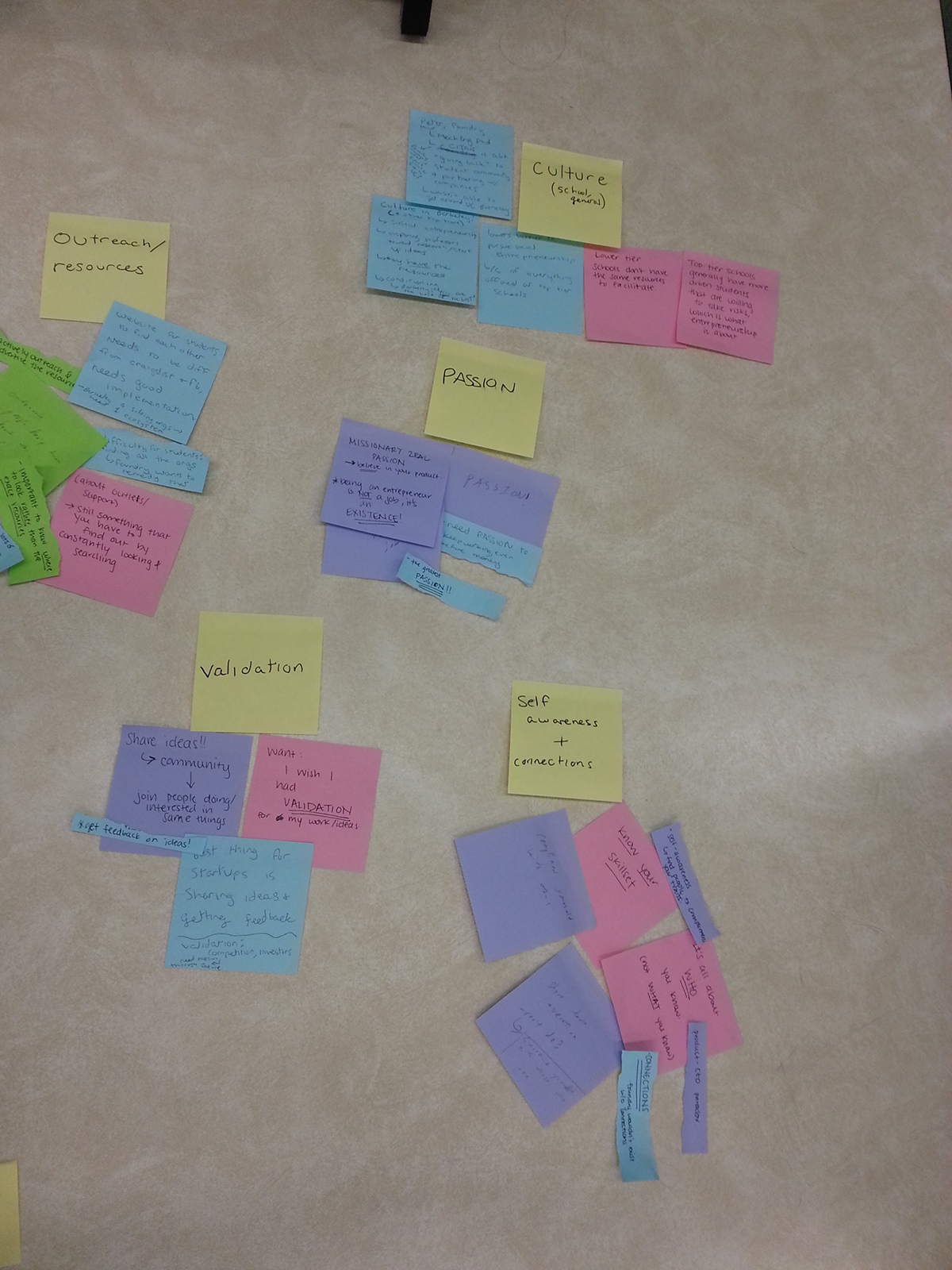
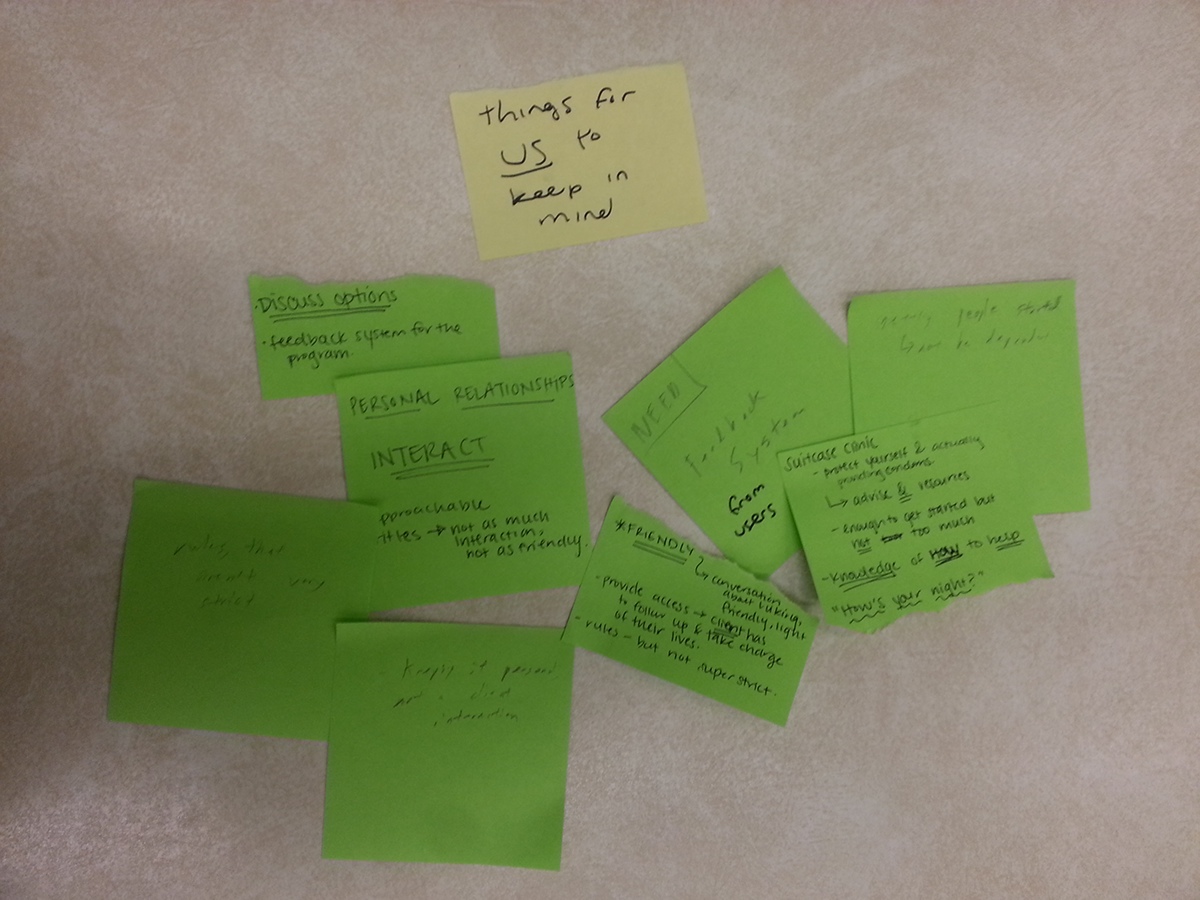



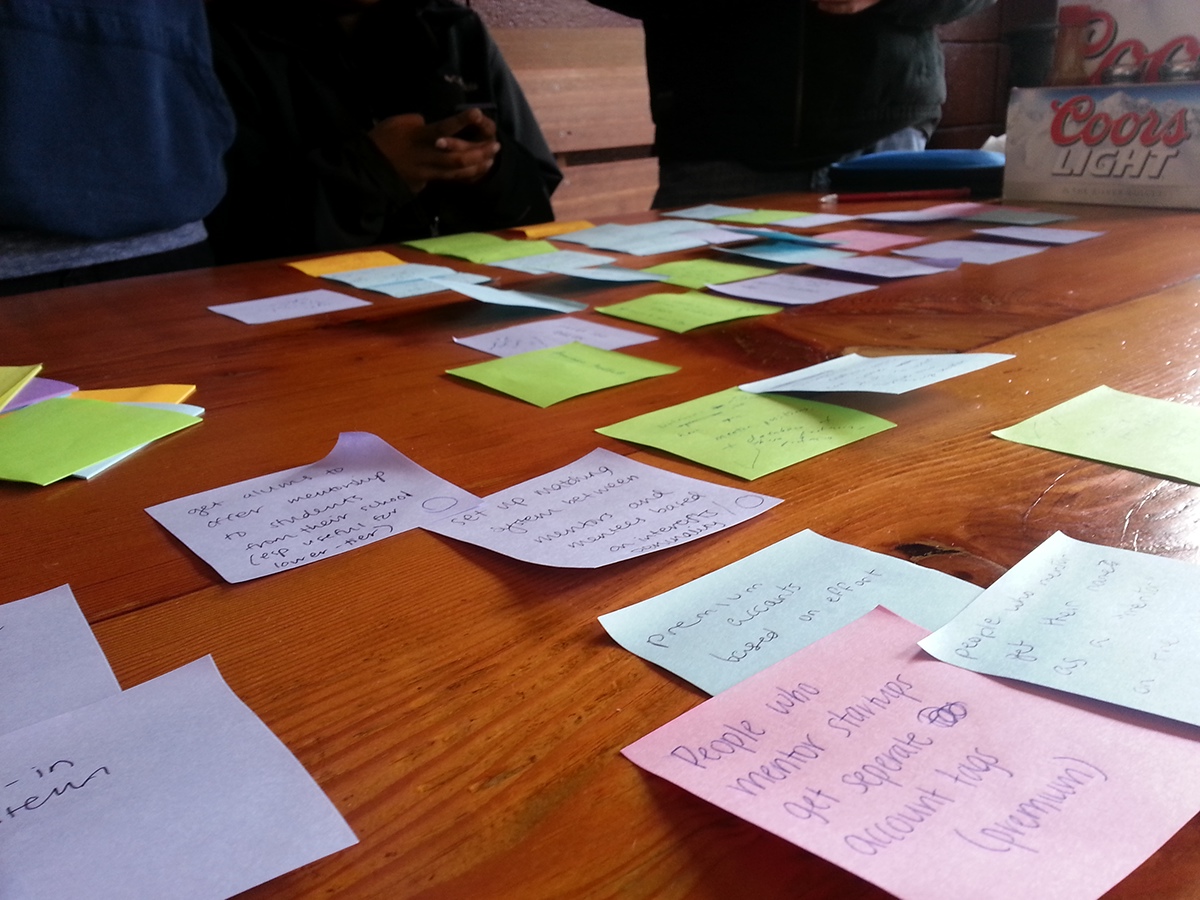
Sorting and Need-Finding
Clustered the research and derived user needs.
Clustered the research and derived user needs.

Creating Problem Questions
Answering "How Might We" Questions.
Answering "How Might We" Questions.
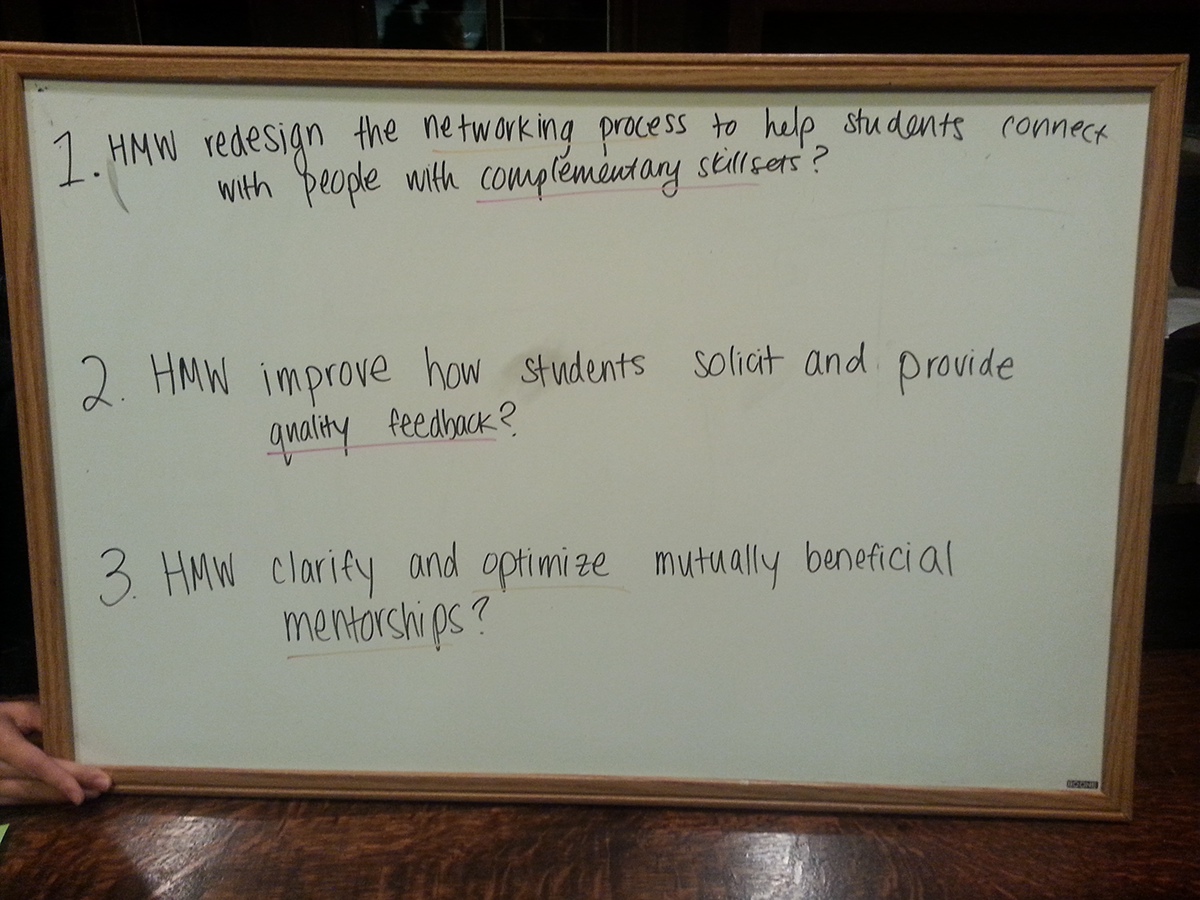
Issues
Isolated the most important needs to make a entrepeneur venture possible. We focused on finding a team and minimizing risk by providing a feedback system.
Isolated the most important needs to make a entrepeneur venture possible. We focused on finding a team and minimizing risk by providing a feedback system.
Concept Generation
Prototyping a web/app-based concept that serves as a student gathering for idea bouncing, team finding, team building and feedback.
Prototyping a web/app-based concept that serves as a student gathering for idea bouncing, team finding, team building and feedback.



